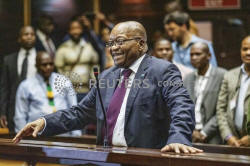UK lawmaker blames HSBC, Stanchart, Baroda in South
Africa corruption
 Send a link to a friend
Send a link to a friend
 [November 18, 2019] By
Tim Cocks [November 18, 2019] By
Tim Cocks
JOHANNESBURG (Reuters) - Corruption under
South Africa's former president Jacob Zuma was enabled by international
banks, companies and governments which should now seek to recover the
loot they helped to launder, British lawmaker Peter Hain told an inquiry
on Monday.
HSBC, Standard Chartered and India's Bank of Baroda as well as their
senior directors were "directly culpable" in the looting of South
Africa's treasury under Zuma, Hain said in his submission to the
Judicial Commission of Inquiry into Allegations of State Capture.
Hain was invited to give evidence because he had already named several
corporates he was investigating under parliamentary privilege in 2017 as
complicit in state capture.
HSBC said it fully supported the commission's inquiry, while Standard
Chartered said there was no evidence linking it to the Guptas directly.
Bank of Baroda did not respond to a request for comment.

"They're all up to their neck in this," he told the inquiry at his
appearance.
"They continued because of course the corporates concerned, including
the banks, were making money out of it...The Guptas could not have
amassed this illicit wealth without the corporates and the banks ...
being their little helpers."
Zuma, who was removed as president last year over corruption
allegations, is facing a judicial inquiry. He has agreed to cooperate
but has dismissed the probe as prejudiced.
Part of its brief is to investigate accusations that the Guptas -
prominent businessmen brothers Atul, Ajay and Rajesh — influenced Zuma
over political appointments and state contracts.
Hain, a labour lord and former anti-Apartheid activist, called on the
banks, global corporates and foreign governments to cooperate better so
all those involved are brought to justice.
In his submission he said a number of international banks helped the
Guptas cloak the source of their funds - by allowing them to open and
maintain bank accounts, even after allegations of their involvement in
corruption became public, and also by allowing them to transfer illicit
funds into these accounts.
"The warning signs were there and they did very little about it," he
said of the banks, adding that when he had tried to question the banks
after he had named them in parliament as complicity he "found a great
reluctance, citing ... client confidentiality, which is the excuse they
hide behind.... The international banks, HSBC, Standard Chartered and
Bank of Baroda are hiding behind this principle to conceal their
complicity."
[to top of second column] |

Former South African President Jacob Zuma appears in court where he
faces charges that include fraud, racketeering and money laundering
in Pietermaritzburg, South Africa, October 15, 2019. Michele Spatari
/Pool via REUTERS/File Photo

The role of global finance in facilitating corruption, fraud and money
laundering has come under increasing scrutiny over the past decade, but the
fight against financial crime is mostly dealt with by national authorities who
often fail to cooperate effectively.
Among his recommendations are to improve transparency around the beneficial
owners of companies. He also proposes better programmes for auditing the due
diligence conducted by banks to ensure that they are complying with anti-money
laundering laws, and stiffer penalties for individuals and organisations that
fail to do so.
An HSBC spokeswoman said the bank will continue to investigate any potential
links to the Guptas or Gupta-related individuals and companies should new
information come to light.
"This is no easy task given the lengths to which the Guptas have gone to
disguise their activity," she said.
A spokesman for Standard Chartered said: "We have found no evidence that we
banked the Guptas directly, but we closed all accounts we identified as linked
to their business interests by early 2014."
It declined to comment further on the grounds of client confidentiality.
The Guptas also deny the accusations and say they have been victims of a
political attack. They have since closed their South African operations in
mining, media and technology.
Hain's report said that they currently reside in Dubai, and call on the Dubai
authorities to extradite them to South Africa to face questioning over the
allegations.
(Additional reporting by Ed Cropley, Laurence White and Rachel Armstrong in
London and Nupur Anand in Mumbai; Editing by Angus MacSwan)
[© 2019 Thomson Reuters. All rights
reserved.] Copyright 2019 Reuters. All rights reserved. This material may not be published,
broadcast, rewritten or redistributed.
Thompson Reuters is solely responsible for this content.

 |